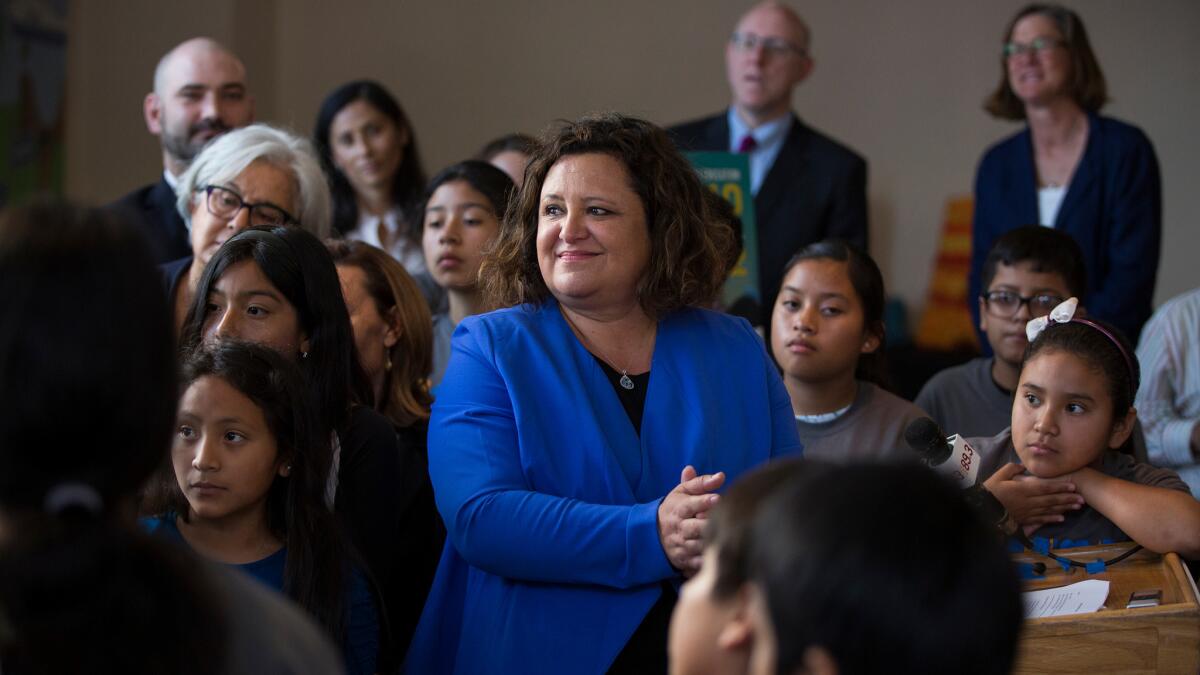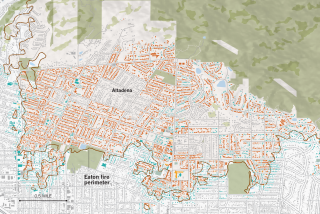Controversial group that supports charter schools announces grants to replicate strong L.A. Unified campuses

- Share via
A group that was spawned from a controversial plan for rapid charter-school growth announced Wednesday that it would fund grants to incubate new campuses run by the Los Angeles Unified School District.
Great Public Schools Now describes its mission as replicating successful schools in areas where Los Angeles students currently attend failing ones. The schools defined as failing invariably are operated by L.A. Unified. Nonetheless, L.A. Unified will be an early recipient of “great schools” grants — if the district can meet the specified conditions, said Myrna Castrejón, executive director of the locally based group.
The grants, totaling as much as $3.75 million, would help jump-start up to five L.A. Unified projects.
“We are excited to begin this collaboration with L.A. Unified schools,” Castrejón said in a statement. “Our goal is to increase the number of students enrolled in high-quality programs, and to do so quickly.”
Her organization was born out of a confidentially circulated plan, obtained by The Times, that envisioned pulling half the students from the nation’s second-largest school system into charter schools. Charters operate independently of L.A. Unified and their growth to date — with about 16% of district enrollment — is one important factor contributing to the district’s budget woes because education dollars follow the students.
Charters have proved popular with thousands of parents, and L.A. Unified has more of them within its boundaries than any other school system.
Critics of the original charter-growth plan said that it would bankrupt L.A. Unified and asserted that such an outcome was probably one of the goals.
That first plan was spearheaded last year by the Eli and Edythe Broad Foundation, which holds a seat on Castrejón’s board. But the goals have evolved, and the group should not be viewed as anti-L.A. Unified, Castrejón said.
Emphasizing possible collaboration, the group’s news release on Wednesday included a comment from L.A. schools Supt. Michelle King.
“I am excited about the opportunities to increase the number of high-quality choices for our L.A. Unified families,” King said. “We have schools in every corner of the district where students are excelling. Investing in these campuses will allow more of our students to attain the knowledge and skills to be successful in college, careers and in life.”
She added: “I have encouraged our local district superintendents to identify our most successful models and to work with their teams to develop competitive and forward-thinking proposals,” King said.
Wednesday’s announcement marks the second installment of grants. Earlier, the group awarded funds to Teach for America, an enrichment program and a charter school.
The grants will be awarded to school leadership teams that have demonstrated success. At least half of their students must have met or exceeded proficiency in English or math on state standardized tests. Funding also could go to a team at a campus where test scores are much higher than surrounding ones with similar students.
Eligible schools also must enroll special education students and English language learners at rates comparable to district schools as a whole.
Christopher Downing, superintendent of L.A. Unified’s Local District South, oversees a region that includes “failing” campuses and is among areas targeted by Great Schools. Downing said he chooses to emphasize the upside of potential added resources.
“We believe that we are the best option for the students currently attending our schools and that this opportunity will allow us to bring in additional revenue to help us toward our goal of high-quality instruction,” Downing said.
Initiatives already under way, such as collaborations with local colleges and dual-language programs, would keep his local campuses competitive, he added.
Administrators can apply by Oct. 28 for planning grants. The deadline for complete applications is February.
Proposals will be vetted by an advisory committee. The final decision, for funding ranging from $50,000 to $250,000, will be made by the board of Great Public Schools Now.
School board President Steve Zimmer, a frequent charter-school critic, said he supports efforts that could improve programs for L.A. Unified students but said he continues to have concerns about Great Public Schools Now.
“I am skeptical that opening dozens or hundreds of new schools is the answer,” Zimmer said. “Any effort at any large-scale expansion of charters schools within L.A. Unified is a signal that whoever is behind that expansion is purposely and intentionally trying to bring about the end of this district.”
Twitter: @howardblume
To read the article in Spanish, click here
Editor’s note: Education Matters receives funding from a number of foundations, including one or more mentioned in this article. The California Community Foundation and United Way of Greater Los Angeles administer grants from the Baxter Family Foundation, the Broad Foundation, the California Endowment and the Wasserman Foundation. Under terms of the grants, The Times retains complete control over editorial content.
MORE EDUCATION NEWS
L.A. school board members dream of 100% graduation
L.A. targets full-time community college students for free tuition
What a Holocaust survivor has to say to South L.A. school kids — and how she uses art to connect
UPDATES:
3:45 p.m.: This article was updated with comments from L.A. Unified senior regional administrator Christopher Downing.
More to Read
Sign up for Essential California
The most important California stories and recommendations in your inbox every morning.
You may occasionally receive promotional content from the Los Angeles Times.











